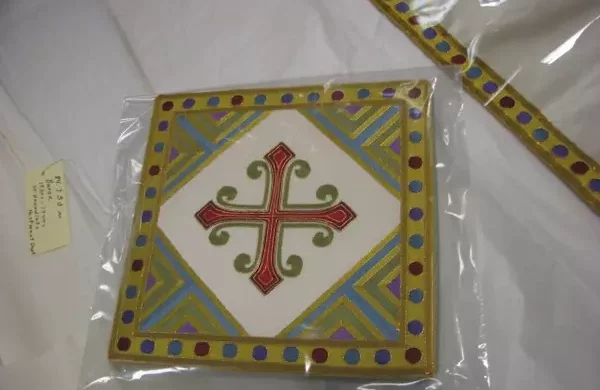
Entering the world of Ecclesiastical Sewing may seem challenging, with fears of intricate designs and historic techniques. However, beauty lies in simplicity, like a humble 1930s hand-embroidered cross. Draw inspiration from vintage patterns, such as Thomas Brown’s Church Embroideries, offering a variety of ideas. For machine embroidery enthusiasts, Windstar Embroidery digitizes Thomas Brown’s designs, providing creativity suggestions for hand embroiderers. Those with artistic talent can create personalized designs, adding a unique touch. To start, consider creating a stole, a beginner-friendly Ecclesiastical Sewing project.
Like this:
Like Loading...
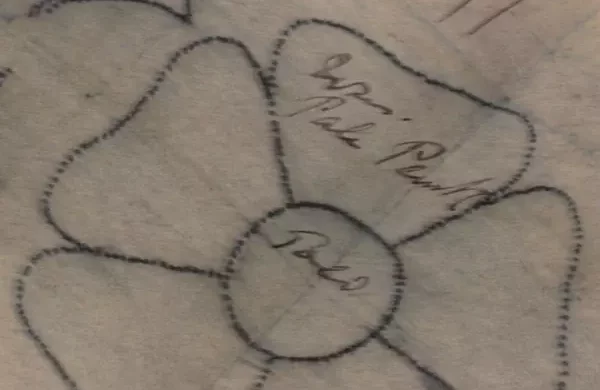
The Monastery’s Ecclesiastical Embroidery Designs are truly amazing. What stands out is that many of these beautiful designs originated from understanding of geometry, design, scale and proportion. The Sisters, who created these designs, studied theology, understood the history and meaning behind symbols, and skillfully combined all this knowledge to create stunning Ecclesiastical Designs.
Like this:
Like Loading...
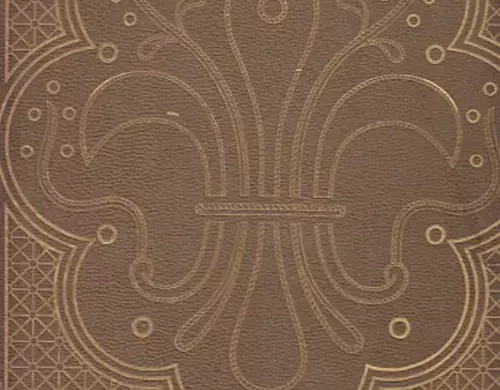
Passionate about Ecclesiastical Embroidery, I’ve collected rare books and found a rare to find book by Mary Barber entitled Some Drawings of Ancient Embroidery and received three sample designs from a closing monastery’s Art Needlework Department. The designs, featuring a Rose and Thorn, IHC, and Sword and Keys, offer a glimpse into the artistry of Ecclesiastical Embroidery.
Like this:
Like Loading...
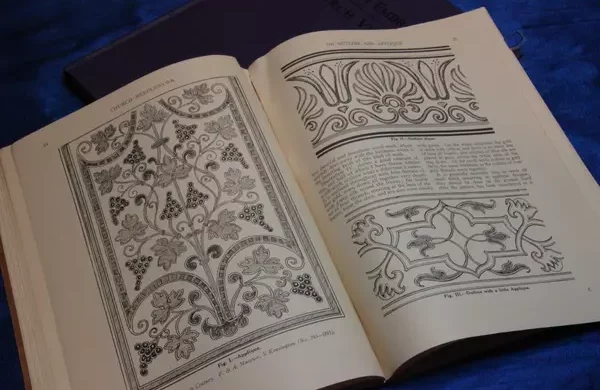
Changed plans for Advent Set due to lost time and supply delays.
A quick review from “Church Needlework” by Hinda Hands for ideas and now focusing on appliqué and outline work, balancing harsh designs with scroll accents. Using modern fusible web instead of paste for appliqué. Applying Alpha and Omega symbols directly to blue Silk Dupioni, so cutting fabric and adapting plans. Ecclesiastical Sewing project takes unexpected turns!
Like this:
Like Loading...
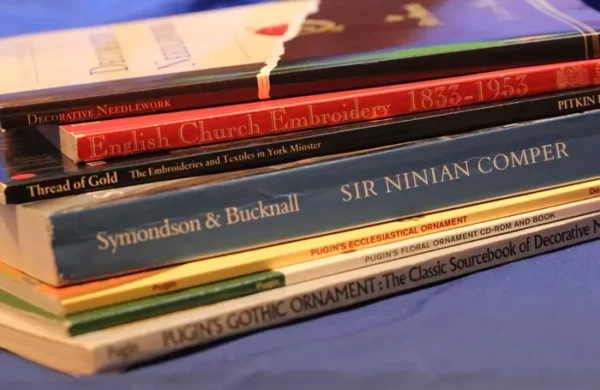
For those interested in church needlework, a few places offer courses worth exploring. Hexaemeron provides Traditional Icon embroidery classes, conducted by Olga Fishchuk, focusing on Byzantine and Russian embroidery techniques from the 14th to the 17th centuries. The classes, held at various US locations, offer rich instruction and historical context. On a different note, the Williamsburg School of Needlework in Colonial Williamsburg offers courses on whitework, suitable for church linens. The courses range from basic sessions to specialized topics like sacred monograms. Check out their detailed hand embroidery course descriptions for more information.
Like this:
Like Loading...
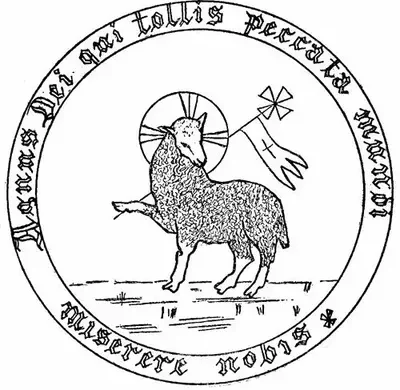
Looking for Ecclesiastical symbols? Check “Christian Symbols” for a book on Christian symbols and free PDF downloads. “Project Canterbury” has “Embroidery for Church Guilds” with simple designs. “Corpus Christi Watershed” archives complex Catholic Line Art. These resources inspire meaningful Ecclesiastical Embroidery projects.
Like this:
Like Loading...
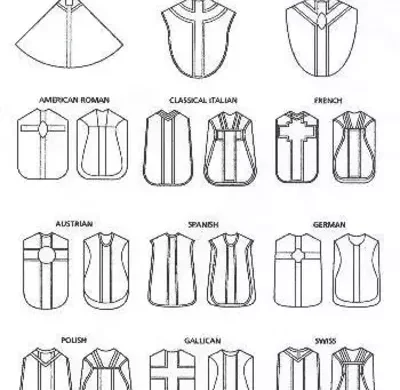
Monk habits, historical garments made in monasteries, had unique designs, each order having its own variations. The patterns and techniques were kept secret. With changing times, habits faded, and the knowledge of making them vanished. Traditional Monk Habit patterns and construction techniques are now disappearing with the loss of skilled tailors.
Like this:
Like Loading...
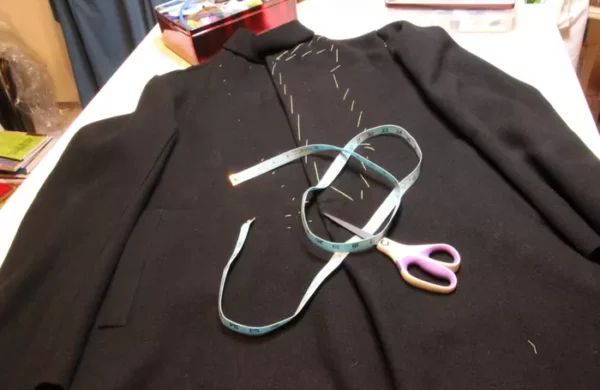
Returning Home – Monastic Habit – a young tailor from a monastery asked help with fitting, construction, and pattern drafting skills for a Monk Habit. Faced challenges with historical pattern blocks and sleeve fitting. After extensive research, they discovered instructions for drafting the Monk habit, successfully completing the pattern.
Like this:
Like Loading...
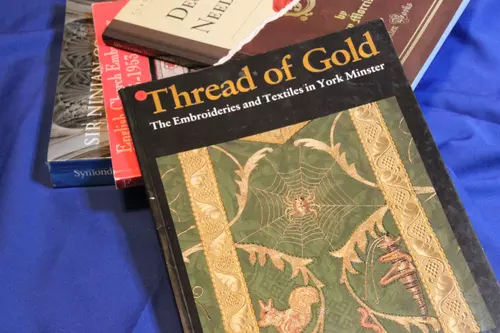
In “Books: The Next Best Thing Part III,” the focus is on Ecclesiastical Giants from the past two centuries. discovering “Thread of Gold: The Embroideries and Textiles of York Minster.” This book, edited by Elizabeth Ingram, offers the history of Ecclesiastical Embroidery and Vestments at York Minster. From pre-Reformation origins to fascinating stories about Queen Victoria’s silk and the restoration of the Great Processional Banner, the book provides a rich visual and historical embroidery.
Like this:
Like Loading...
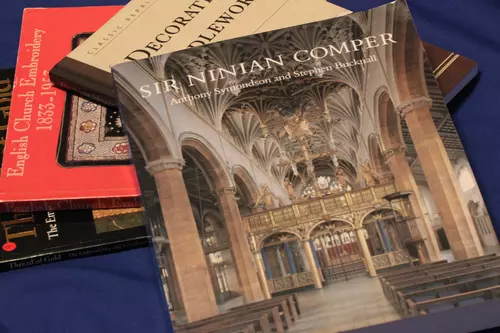
Ecclesiastical Sewing looks at Sir Ninian Comper’s work in the book “Sir Ninian Comper” by Anthony Symondson and Stephen Bucknall. Born in 1864, Comper aimed to make beautiful things that lead people to worship God. The book, with black-and-white photos, shows Comper’s creations like altars and beautiful copes with detailed embroidery. His idea was simple: “A person should like beautiful things from a young age.” The book gives a peek into Comper’s lasting influence on Ecclesiastical design.
Like this:
Like Loading...
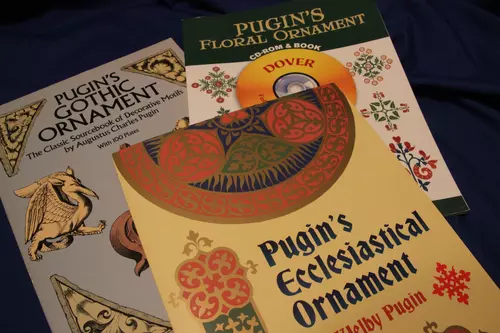
Ecclesiastical Sewing explores new books on Ecclesiastical Giants as an alternative to attending the Giants of Gothic Revival event at the Victoria and Albert Museum. The collection includes works by Augustus Welby Northmore Pugin, such as “Pugin’s Gothic Ornament,” “Pugin’s Floral Ornament,” and “Colored Plates from Pugin’s Ecclesiastical Ornaments.” These books offer insights into Pugin’s intricate designs and patterns, from wood and stone carving to delicate floral motifs. Additionally, Pugin’s “Glossary of Ecclesiastical Ornament and Costume” provides valuable insights into various Ecclesiastical terms.
Like this:
Like Loading...
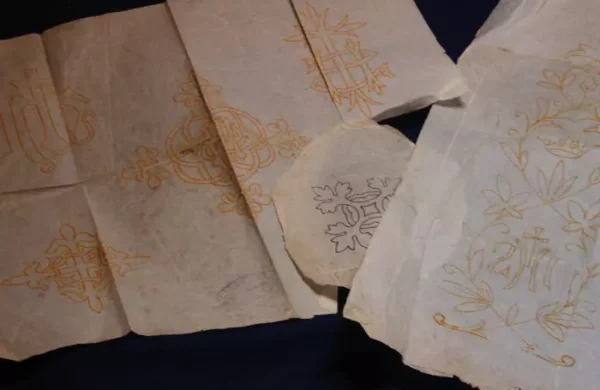
Discovering hidden treasures in vintage Ecclesiastical Embroidery transfers is always exciting. While exploring a worn book, unexpected finds emerged, including a small iron-on transfer suitable for stole ends or whitework on Church Linens. Moreover, a larger transfer sheet with four designs, and another long and narrow design, provided valuable resources for enhancing Ecclesiastical Embroidery projects.
Like this:
Like Loading...
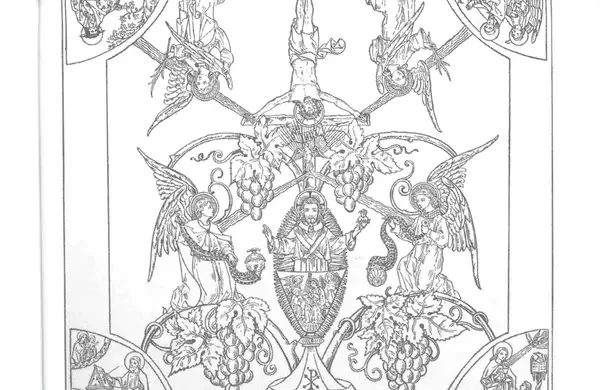
Alethea Wiel, a skilled Ecclesiastical Artisan from 1894, designed a Chalice Veil rich in symbolism. The illustration includes a chalice on seven rocks representing the Seven Sacraments, with the Nativity engraved on the chalice. Angels, Luke, and John surround Christ, while the reverse side showcased the Crucifixion with angels shielding their eyes. A vine, symbolizing Christ, intertwines throughout the design.
Like this:
Like Loading...
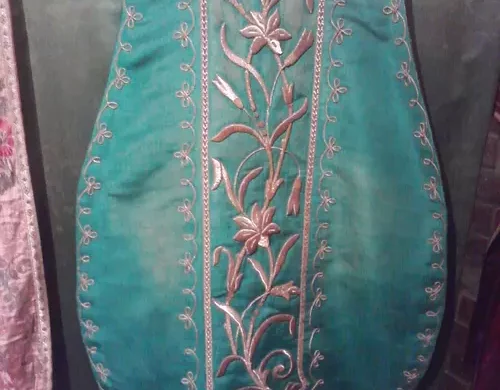
Ecclesiastical Sewing and embroidery elevate pieces through simple details. Inspiration comes from various sources, such as photos, sketches, and notes. For instance, a plain green chasuble with goldwork embroidery gains visual appeal with a flowing gold scroll twist along the galloon trim. This detail softens the transition between the large floral motif and the clean galloon line, enhancing the overall design.
Like this:
Like Loading...
Ecclesiastical Sewing, a traditional craft, provides a glimpse into history and tradition. Exploring vestments worldwide on platforms like Pinterest reveals beautiful hand-embroidered pieces from countries like Russia and Ukraine. A document by the Metropolitan Museum of Art explains the differences between Orthodox and Western Church vestments, showcasing the Russian Phelonion. The ornate vestments from 1802 to 1877 feature luxurious materials, gold, silver, bells, and unique garment labels, offering insight into the rich history of ecclesiastical textiles.
Like this:
Like Loading...

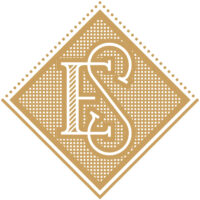













You must be logged in to post a comment.